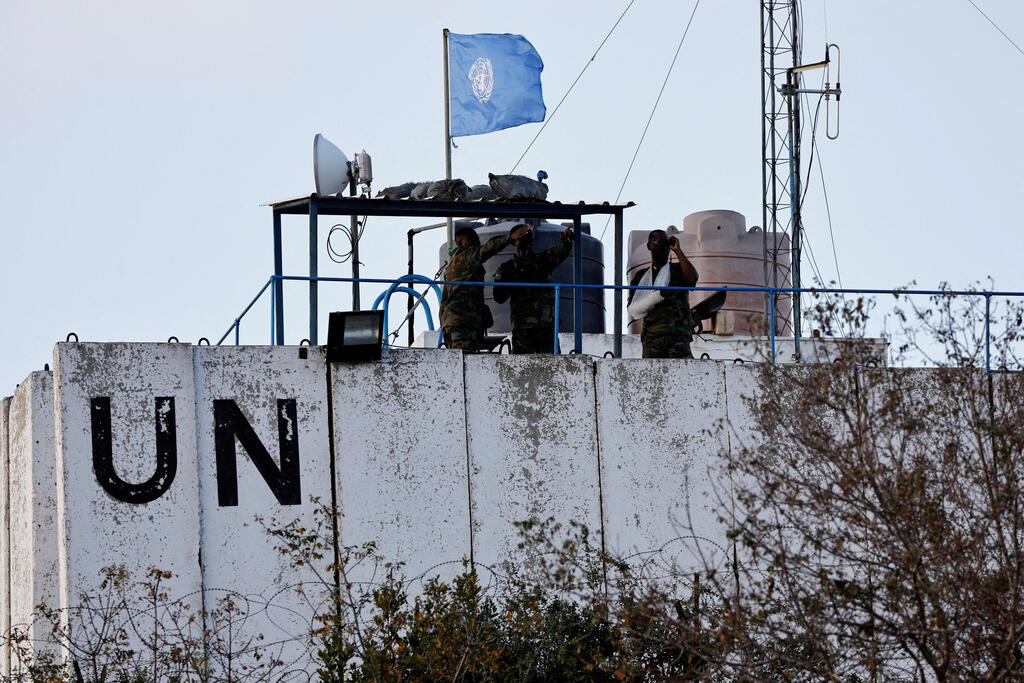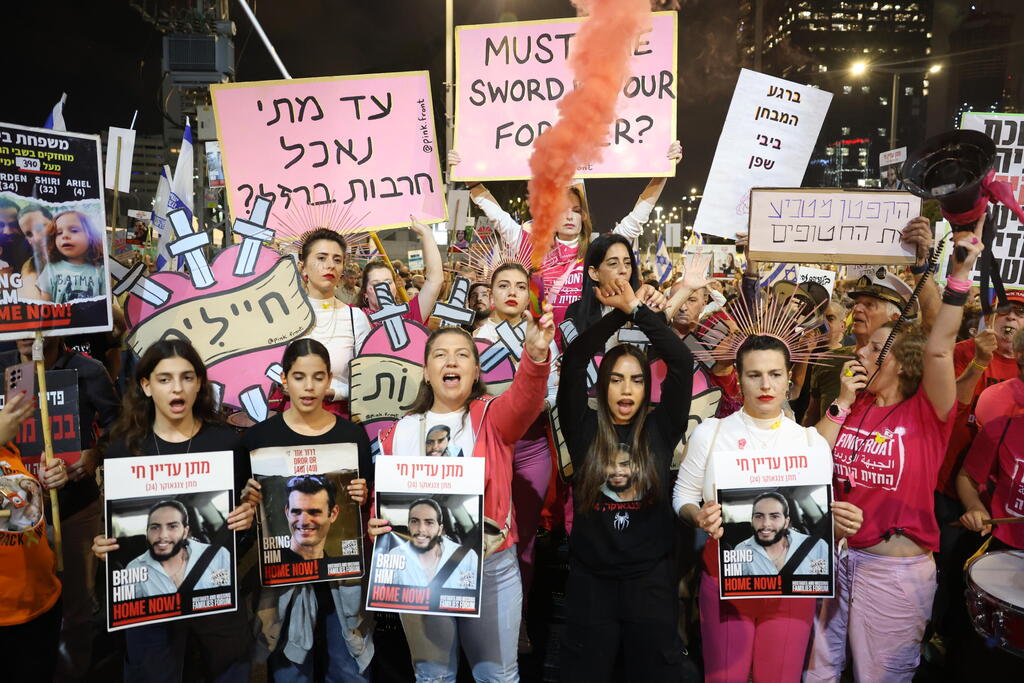Getting your Trinity Audio player ready...
The original UN Resolution 1701, adopted by the UN Security Council at the end of the 2006 Lebanon War, was a strong agreement from Israel’s perspective. The problem was that none of the parties responsible for enforcing it on the ground actually did so.
Successive Israeli governments, while seeking quiet, turned a blind eye to Hezbollah’s gradual entrenchment in southern Lebanon. Even as the terror group began launching rockets and stoking border tensions, Israel refrained from responding and certainly did not enforce the resolution on the Lebanese side.
3 View gallery


Prime Minister Benjamin Netanyahu, US special envoy Amos Hochstein and Hezbollah Secretary-General Naim Qassem
(Photo: Kawnat HAJU / AFP, Yariv Katz, REUTERS/Mohamed Azakir)
UNIFIL, the UN peacekeeping force established to oversee the agreement, also failed. Intimidated by Hezbollah’s threats, it avoided confrontation and limited itself to ineffective reports of violations by both sides.
The third entity tasked with enforcement, the Lebanese Armed Forces (LAF), also did nothing, even as Hezbollah’s elite Radwan Force erected observation posts just feet away from its bases. In practice, Hezbollah outmaneuvered everyone. Even as Israeli intelligence and the Northern Command gathered extensive evidence of Hezbollah’s military buildup disguised as civilian or environmental activity, no action was taken by any of the parties involved.
This history raises doubts about the current emerging arrangement, which is essentially Resolution 1701 with an added layer of legitimacy for Israel to enforce it. An international mechanism, led by a U.S. general, is expected to handle complaints about violations. This mechanism would theoretically authorize Israeli enforcement actions if Lebanon’s government, military and UNIFIL fail to compel Hezbollah to dismantle its activities and disguised infrastructure in the area.
Based on reliable sources and what has already been published, the enforcement process on the ground—touted as the centerpiece of the emerging agreement—is seen by the Israeli government as cumbersome, inefficient at worst and unnecessary at best.
According to reports, Israel will have immediate response and enforcement rights if Hezbollah attacks its sovereignty or citizens using rockets, mortars, anti-tank missiles, explosives planted along the border or infiltrations into its territory.
Israeli airstrikes in Beirut's Dahieh district
However, Israel already possesses the inherent right to respond to such blatant violations. Instead of delivering a decisive and destructive response to border breaches or rocket fire—often carried out by Palestinians under Hezbollah’s direction—Israel has repeatedly opted for restraint.
Israel’s natural right to self-defense does not require codification in any agreement. It can respond to any attack, infiltration or other aggression from Lebanon using whatever means the IDF deems appropriate. A formal memorandum with the U.S. is unnecessary to validate this right.
What Israel’s leadership—especially Prime Minister Benjamin Netanyahu—needs is the resolve to stop tolerating such violations and to respond firmly. The real challenge lies in addressing the more subtle, long-term violations that Hezbollah has engaged in for years, building its infrastructure above and below ground, often concealed within Shiite villages near the border and surrounding wilderness.
Hezbollah has also flagrantly violated UN Resolution 1701 by constructing missile and drone launch bases across Lebanon, not just in the south. The difference is that in southern Lebanon, Hezbollah initially attempted to conceal these activities, particularly during periods when Israel refrained from conducting reconnaissance flights over Lebanese territory or when it accepted the deterrence equations imposed by Hezbollah leader Hassan Nasrallah. These periods of inaction allowed the organization to grow into a heavily armed force, plotting operations like its "Galilee invasion plan."
What happens next time Shiite villagers return to their destroyed homes, and Hezbollah "assists" in rebuilding by installing weapons depots, observation posts and firing positions beneath and within the structures?
Under the emerging agreement, Israel would need to file a complaint with the international committee, led by the U.S. general and his peers from Britain, France and an Arab state. The committee would demand evidence, forcing Israel to disclose its intelligence-gathering methods and prove the violations weren’t merely innocent construction.
Lacking its own enforcement mechanism, the committee would then turn to the Lebanese Armed Forces—many of whose soldiers and commanders are Shiites—and UNIFIL, asking them to compel Hezbollah to dismantle the violations identified by Israel. It is highly unlikely these entities will be more effective now than they were between 2006 and 2023. Hezbollah will likely continue to intimidate them and act with impunity across Lebanon, leaving Israel to repeatedly seek committee approval and prove its claims while UNIFIL and the Lebanese Army fail to act.
Another troubling signal is the U.S. demand that Israel intercepts weapons smuggling only in Syria, not Lebanon.
This cumbersome mechanism recalls the ineffective armistice commissions established along Israel's borders in 1949 after the War of Independence. These UN-backed committees meticulously documented violations by all sides but were ultimately powerless to enforce compliance. Only decisive Israeli military actions—like the 1950s reprisal operations—served as effective deterrents.
Thus, while the new Lebanon agreement holds diplomatic value, it is unlikely to prevent Hezbollah’s entrenchment. Only proactive Israeli military operations, with or without committee approval, can transform this deal from a symbolic gesture—like the failed Resolution 1701—into an effective arrangement.
The current agreement carries importance in two key areas. First, it ends the ongoing fighting, allowing the IDF to reorganize for more effective border defense while enhancing intelligence capabilities to detect Hezbollah violations as they occur. This would enable Israel to act swiftly against infractions while Hezbollah remains weakened and unable to mount a strong response.
Get the Ynetnews app on your smartphone: Google Play: https://bit.ly/4eJ37pE | Apple App Store: https://bit.ly/3ZL7iNv
The second, and perhaps most significant, advantage of the agreement is its potential to isolate Hamas in Gaza. It could serve as a model for a similar arrangement in the south, including the release of hostages and the establishment of an international and inter-Arab administration to replace Hamas as a civilian governing body.
Notably, the preamble to UN Resolution 1701, which underpins the current Lebanon arrangement, also addresses the release of hostages. While the original context referred to Ehud Goldwasser and Eldad Regev, both later confirmed killed, the resolution explicitly mandates the release of captives—providing a potential basis, with adjustments, for a similar framework in Gaza.
These are critical days, as Hezbollah seeks to project strength and claim it ended the war on favorable terms. It is well understood that there is often a lag between a diplomatic agreement and its implementation on the ground. In the coming days, the IDF must continue offensive operations until the last possible moment.
Meanwhile, civilians must remain vigilant and adhere to Home Front Command instructions. Hezbollah may attempt to exact a price in the hours before the agreement takes effect—and possibly in the days following.








